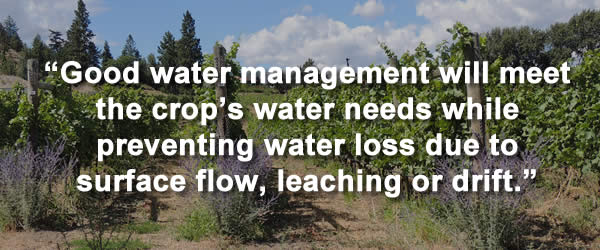
Minimize water losses
- Fix leaks, and check if nozzles need replacing.
- Minimize evaporation during irrigation by choosing the appropriate type of irrigation system and by taking wind and temperature conditions into account.
- Ensure your irrigation system spacing matches the soil and crop needs.
- Consider using drip irrigation for row crops and use sprinklers instead of guns for field crops in windy areas.
Assess and improve your irrigation system
- Assess your irrigation system using the Irrigation Assessment Guide (part of the Environmental Farm Plan Assessments).
- Create an Irrigation Management Plan by filling out the worksheets in the B.C. Irrigation Management Guide.
- Need help? Hire a qualified contractor (IIABC Certified Designer) to evaluate your irrigation system performance and make improvements. Find a list of Certified Irrigation Designers here.
Adjust your irrigation schedule
The amount of water that a crop needs at any given time depends on many factors. Take into account the following considerations to maximize your irrigation efficiency, or use the Agricultural Irrigation Scheduling Calculator.
Know your crop’s water requirements:
Efficient irrigation ensures your crop has enough water during its growing cycle to maximize yields while not wasting water.
(Source: Water Conservation Factsheet, BC Ministry of Agriculture)
Affected by:
- Type of crop
- Stage of crop development
- Temperature and precipitation
- Root depth
Find irrigation calculator user guides for a variety of irrigation systems here.
Visit www.Farmwest.com for the latest weather forecasts for a station near you and for weather-based farm calculators.
Understand how soil conditions affect water application:
Soils can only hold a limited amount of water before the water becomes surface run-off or drains below the root zone where it is not useful to your crop. Over-irrigation (watering more than the soil can hold/absorb) can lead to leaching of nutrients through the soil to groundwater or overland as surface runoff.
To prevent water losses from soils:
Check your soil moisture before irrigating or install soil moisture sensors.
Mulching or less tilling can help to keep moisture in soils longer.
Questions to ask:
- What is the structure of your soil and how much water can the soil hold?
- How does the structure of your soil compare with the root depth of your crop?
Resources:
- NEW! Factsheets, case study & webinar on Improving Water-Use Efficiency For Managing During Dry Conditions
- Agricultural Irrigation Scheduling Calculator and Guides
- Irrigation Scheduling Techniques Factsheet
- Estimating Soil Moisture by Feel and Appearance Factsheet
- Soil Water Storage Capacity and Available Soil Moisture Factsheet
- Factsheets on water conservation and irrigation scheduling
NEXT:

